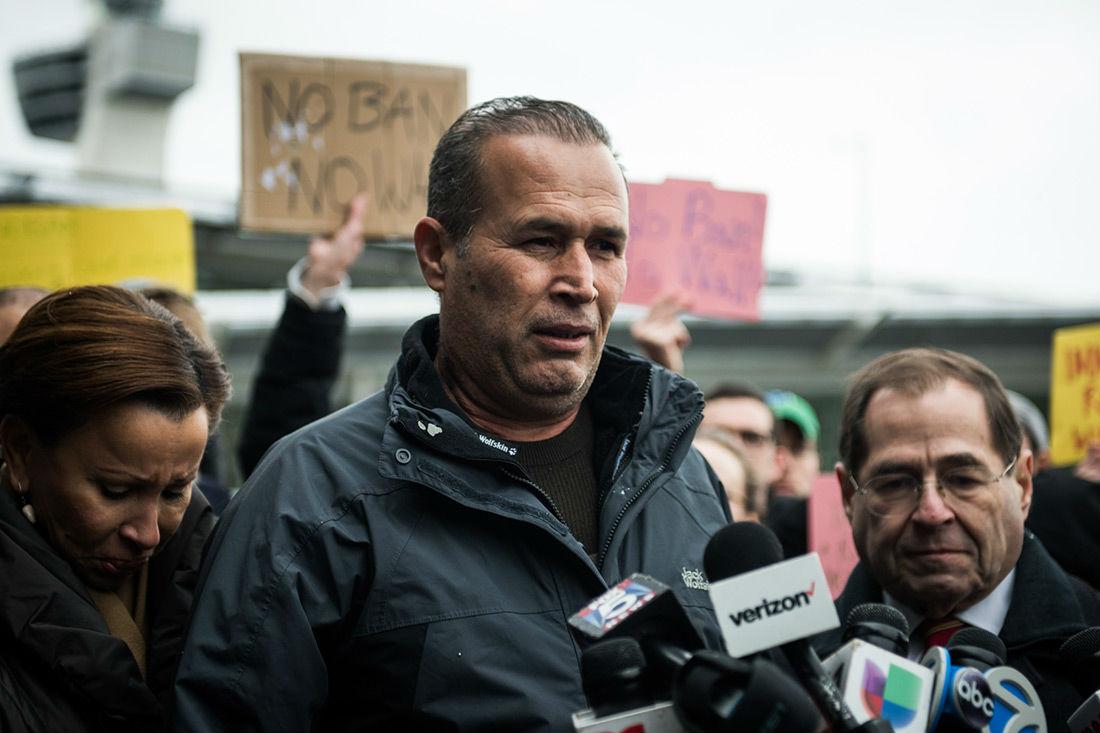Trump administration settles in Muslim ban case, allowing blocked immigrants to reapply for visas
Case was filed by two Iraqis who worked for US in Iraq for a decade

Your support helps us to tell the story
From reproductive rights to climate change to Big Tech, The Independent is on the ground when the story is developing. Whether it's investigating the financials of Elon Musk's pro-Trump PAC or producing our latest documentary, 'The A Word', which shines a light on the American women fighting for reproductive rights, we know how important it is to parse out the facts from the messaging.
At such a critical moment in US history, we need reporters on the ground. Your donation allows us to keep sending journalists to speak to both sides of the story.
The Independent is trusted by Americans across the entire political spectrum. And unlike many other quality news outlets, we choose not to lock Americans out of our reporting and analysis with paywalls. We believe quality journalism should be available to everyone, paid for by those who can afford it.
Your support makes all the difference.Foreigners who were barred from entering the US as a result of Donald Trump’s Muslim travel ban will get official help to reapply for visas, as the government settled the first legal challenge to the President’s original executive order.
Mr Trump’s order, signed on 27 January, halted all refugee admissions and temporarily banned people from seven Muslim-majority nations from entering the country. It sparked chaos at airports around the world, and widespread protests against the President’s actions.
The move also set off a series of legal challenges to Mr Trump’s move. One of these - Darweesh v Trump, which was filed by two Iraqis who had worked for the US in Iraq for a decade and exposed themselves to no small danger - has now been settled.
Civil rights lawyers and the Trump administration told a federal judge in New York they had settled the case that related to the treatment of hundreds of travellers who were detained at US airports over that January weekend.
The case was filed on behalf of the two Iraqis detained at New York’s JFK airport, who had spent the last decade helping the interests of Washington Iraq. One of the men Hameed Khalid Darweesh, worked as an interpreter for the Army’s 101st Airborne Division in Baghdad and Mosul, starting shortly after the invasion of Iraq in 2003.
The lawsuit filed on his behalf said that Mr Darweesh, 53, who arrived with his wife and three children, “was directly targeted twice for his association with the US Armed Forces”.
The second man, Haider Sameer Abdulkhaleq Alshawi, had flown to the US to join his wife, who had worked for a US contractor.
Under the terms of the deal, the government has agreed to notify anyone overseas who was banned that they can reapply for visas with the help of a Department of Justice liaison. The plaintiffs said they would drop all their claims.
Several courts ordered the initial ban lifted. A revised version has replaced it under limitations set by the Supreme Court.
The two men were represented by the International Refugee Assistance Project (IRAP) at the Urban Justice Centre, the American Civil Liberties Union (ACLU), the National Immigration Law Center (NILC), the Worker and Immigrant Rights Advocacy Clinic at Yale Law School, and Kilpatrick Townsend & Stockton LLP.
When he was informed of the settlement, Mr Darweesh, said: “It means a lot to me to be in America. The United States is a great country because of its people. I’m glad that the lawsuit is over.
“Me and my family are safe; my kids go to school; we can now live a normal life. I suffered back home, but I have my rights now. I’m a human.”
Becca Heller, Director of International Refugee Assistance Project at the Urban Justice Centre, said Mr Darweesh and hundreds of others attempted to legally enter the United States.
“They were detained, handcuffed and, in many cases, deported. This settlement forces the government to individually reach out to everyone illegally kept out of the country, and begin to remedy that wrong,” she said.
“But it is only a first step - we continue to fight against the illegal, discriminatory, and un-American provisions of the second Muslim ban.”
Lee Gelernt of the ACLU, said in a statement: “Although the government dragged its feet for far too long, it has finally agreed to do the right thing and provide those excluded under the first Muslim ban with proper notice of their right to come to the United States.
“While this closes one chapter in our challenge to Trump's efforts to institute his unconstitutional ban, we continue our legal fight against Muslim ban 2.0 at the Supreme Court in October.”
At least 700 foreign nationals were detained for questioning in airports across the nation in the wake of the order, according to the ACLU.
The original ban was found unconstitutional, and revised in March. Other district courts across the country, including in Seattle and Hawaii, continue to challenge the ban.
A federal court in Seattle began hearing arguments this week in the government’s appeal of a July order allowing grandmothers and other family members of those already in the country to enter the United States.
The US Supreme Court has permitted an abridged version of the ban to stand until it hears the case in October.
The Department of Justice did not immediately respond to inquiries.
Subscribe to Independent Premium to bookmark this article
Want to bookmark your favourite articles and stories to read or reference later? Start your Independent Premium subscription today.
Join our commenting forum
Join thought-provoking conversations, follow other Independent readers and see their replies
Comments